Photos: See the secret refuge L.A. succulent lovers are buzzing about

Driving down Saticoy Street in Reseda, it's easy to overlook the spot known as the Cactus Ranch. Alert passersby might glimpse some rusty dinosaurs rising above a ramshackle fence and otherworldly plants — a moment of "What the heck was that?" — before it's passed , replaced by endless houses, curbside retail and whatever new distraction grabs their eye.
And that's kind of what makes California Nursery Specialties Cactus Ranch a magical secret place, the way Diagon Alley in the Harry Potter books was open only to shoppers in the know.
At this ranch, massive cereus cactus spill out of their containers or reach thorny arms high into the sky. Hummingbirds dart in and out of the greenhouses, sipping nectar from tiny plants with tall Seussian blooms. Bleached steer skulls, old farm tools and strange industrial implements frame the doorways and poke out from the plants, their purpose long forgotten. And everywhere in this three-acre wonderland there are flats and flats of succulents, in so many colors and shapes they look like patchwork quilts laid out on the tables.
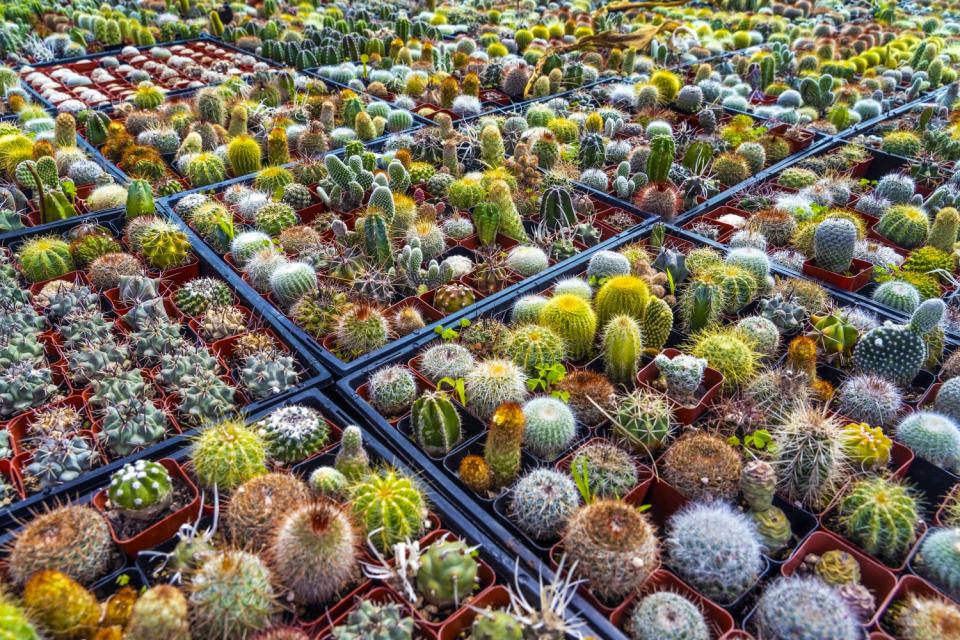
Best of all, the Cactus Ranch feels secret and special because as nurseries go, it's relatively unknown, and thus uncrowded. That's because, during the week, the Cactus Ranch is a wholesale nursery business, closed to the public, but on weekends it's open to anyone from 11 a.m. to 6 p.m. (5 p.m. in winter.)
That bit of anonymity makes the Cactus Ranch relatively uncrowded, the perfect post-pandemic weekend excursion for anyone who enjoys a profusion of plants and color — and is in need of some succulent therapy.

Shoppers wander about with boxes overflowing with tiny pots of daisy-like aeoniums in every color, or carts laden with boulder-sized century plants. If you're not ready to bring home a 6-foot-tall Euphorbia ammak succulent, with its ridged pale-green arms, for instance, or a gallon-size flapjack plant (Kalanchoe luciae), with its pea-green layers of leaves tipped in red, then wander through the greenhouses to find variations of the same plant in smaller sizes.
Every few minutes you hear a little exclamation of wonder — "Look at that one! No, look at this one."
And the owner, David Bernstein, soaks it up with satisfaction.
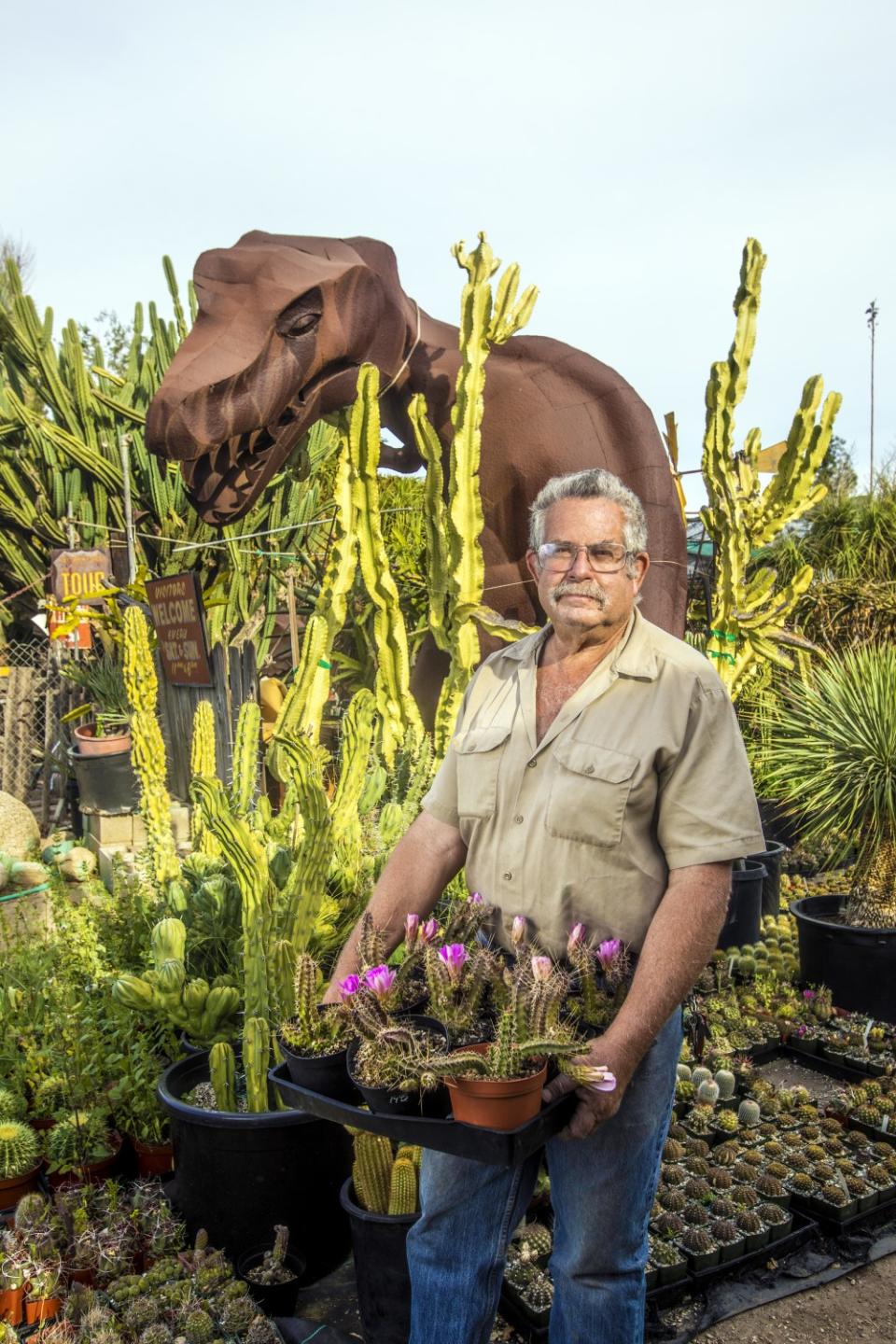
Many of the anointed come to buy but, often as not, people come just to explore and marvel, take photos or even set up an easel to paint.
Bernstein doesn't care. In fact, he encourages visitors to take their time and explore — especially children, who spend too much time indoors, he says, glued to screens. He has intentionally created a crowded, colorful space to help stressed, home-bound people relax and heal.
"I make all the money I need during the week," he says. "So on weekends, I think of this as a sanctuary, a kind of therapy for people shut off from the natural world. We're not just selling plants; we're horticultural therapists here."
And when Bernstein says "we," understand he's really talking about himself. He has a few employees who work with him but this business has been his primary focus for some 45 years. He's usually on the job seven days a week, even on Tuesdays, when the nursery is supposedly closed. That's when he likes to come in and do some planting, he says, because things are quieter then.
"I guess you could say I'm a workaholic," he said, noting that his first and only marriage ended, in part, because his wife didn't appreciate his hours. "But I do like my work, and I get to do a lot of things in my life that people who work 9 to 5 don't get to do, like being outdoors and enjoying what I do. I have different priorities than other people. All I need is a roof over my head, basics to eat and a rototiller for my vegetable garden and I'm happy."
Sharing his passion with the public is also fun, Bernstein said — in small doses. "It's only fun for two days, if you know what I'm saying," he says, adding, "Enough is enough."
Nonetheless, he's almost always there on weekends, even after he's worked all week, patiently answering questions or, when it gets busy, directing people to the handout he created years ago to answer frequent succulent queries ("I've printed up thousands of these") or filling out receipts by hand, because Bernstein doesn't do technology.
He doesn't own a computer or digital cash register, and he does his accounting the old-fashioned way, with pencil and paper.
"Well, I do have an adding machine," he says, a little indignantly, when his bookkeeping methods are met with disbelief.
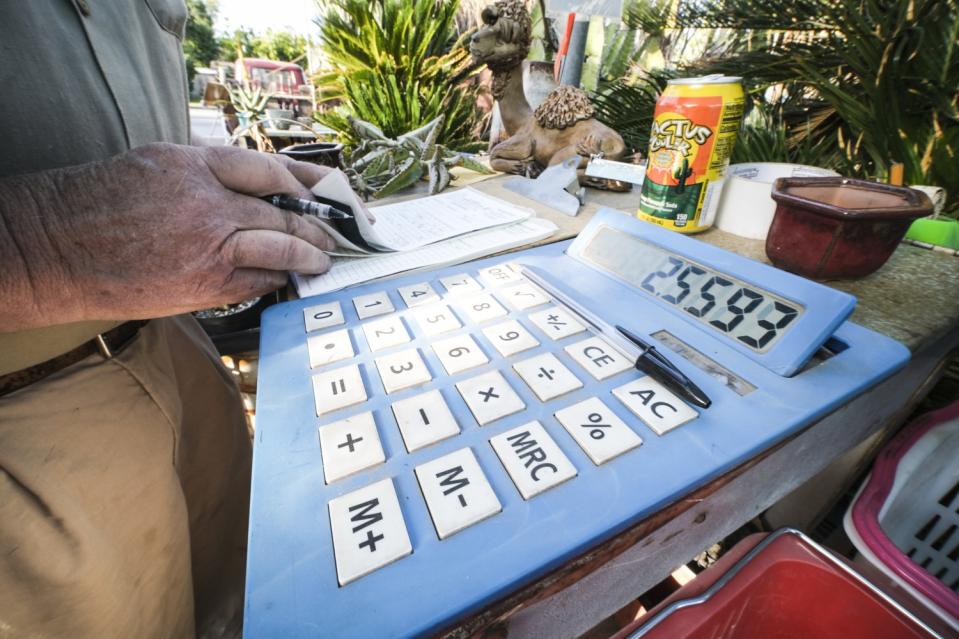
Important note: if you visit and plan to buy, you'd better bring cash or a check, because Bernstein doesn't do plastic.
He says this with good-natured sympathy, because despite the signs on his fence and notices on the website, people always forget, coming to the counter with armloads of plants and standing stunned to learn they can't use their cards to buy. There's an ATM machine at the corner, he says helpfully, pointing down the street.
He only has a website because an incredulous neighbor offered to create one for him 12 years ago, insisting it was crazy to try to operate without one these days. At least in this case, Bernstein admits, technology seems to be working.
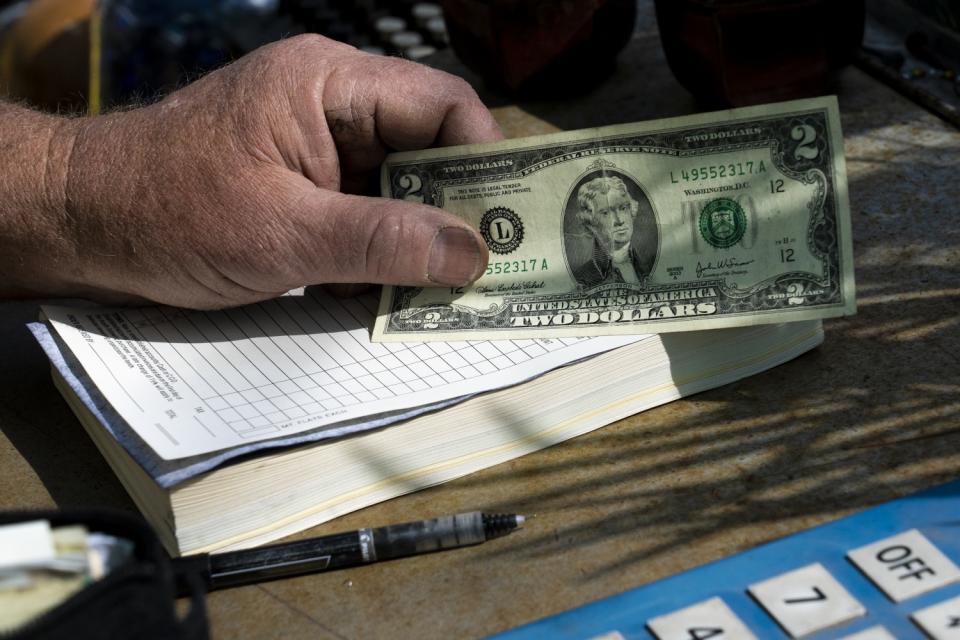
"Lots of people say that's how they found us, and they come from all parts of the world," he said. "The website hasn't changed [since it was created], because there's nothing much to update, but my friend told me recently there's been several million hits, which is almost too hard to believe. Before, people just found me by word-of-mouth, or from the trade shows I attended, but I stopped doing those because I just got too busy and they're so much work."
Bernstein speaks quietly and deliberately, considering every word with the gentle, patient manner of a man who has spent a lifetime coaxing plants to grow.
He's never loud, even when telling a joke or calling to an employee to help a customer, or when his conversation is repeatedly interrupted by his phone. Because Bernstein answers all his calls. Years ago, his mother came in and answered the phones, but since she died he does it himself, his one concession to (sort of) modern technology — a flip phone he carries in his pocket, near the ring of keys dangling from his belt.
Not surprisingly, there's something very retro about this place, and it's more than that beige midcentury Cactus Cooler soda machine humming outside the greenhouse door, which still sells Cactus Coolers for — believe it or not — 50 cents. Partly it's Bernstein himself, who's wearing his "uniform" as always, khaki work shirt and pants, with a dog-eared leather belt and shoes that look like he's worn them since high school. "It makes getting dressed easy in the morning," he jokes.
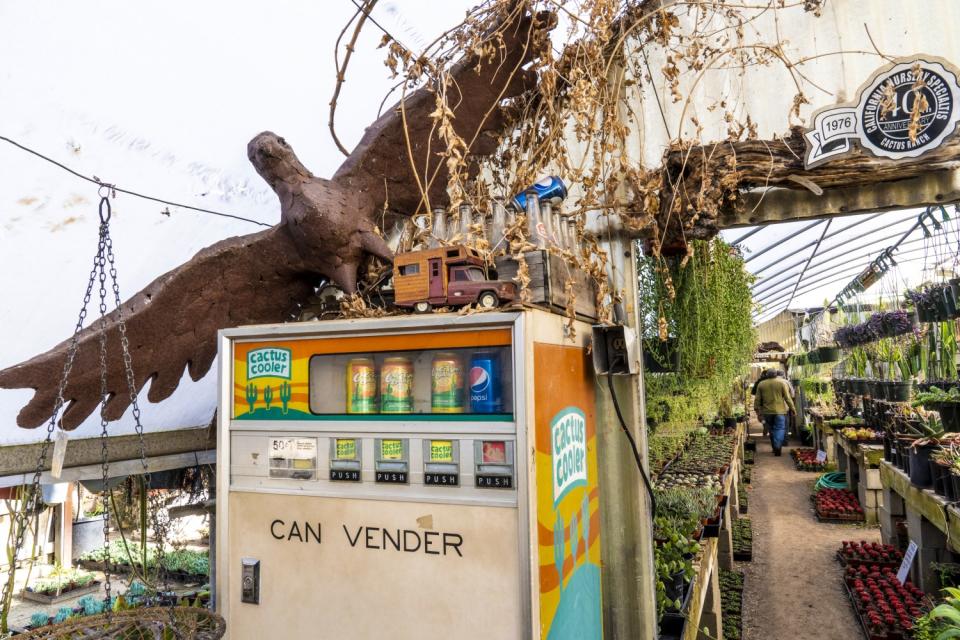
His curly steel-colored hair is cut short but full, so you can imagine a curl escaping the brim of his cap on a particularly hot day. His frayed, blue medical-style mask looks like he's worn it since the beginning of the pandemic; pens bristle from both of his shirt pockets.
And then there's his flip phone, which seems to ring constantly. The calls have interrupted his story three times now, and he lets out a tiny exhalation. But when he answers it's always with the same friendly, unflappable voice.

Bernstein started propagating houseplants as a high school student and member of the Future Farmers of America program, and he sold everything he grew. After graduation in 1976, he used the money he earned, plus some from his mom, to take over the mortgage on the land where his nursery stands today. He grew all kinds of houseplants wholesale while he got a horticultural degree at Pierce College, but by the mid-1980s he put all his efforts into succulents.
From a practical standpoint, succulents are just easier to grow than houseplants. "Foliage plants are a lot of trouble to grow," he said. "It requires constant vigilance, with spraying all the time with fungicides and chemicals — I hate spraying chemicals or being exposed to them — and you have to stay on top of the watering to the nth degree...."
But ultimately, Bernstein says he was seduced by the wonder and diversity of succulents and cactus. "I didn't realize there were so many varieties. You could spend your whole life studying just one genus, like echeveria, and never see them all."
Plus, by the early 1980s, everybody was growing houseplants, Bernstein said, and he wanted to specialize in something different, so he sold all his houseplants and launched into succulents full force. He tracked down hobbyists who were willing to sell pieces of unusual varieties that he could propagate into new plants. He joined succulent societies and traded plant parts from members. "And for a while even the Huntington Library in San Marino was offering material from their (cactus) garden for trade," he said. "I got several new introductions from there."
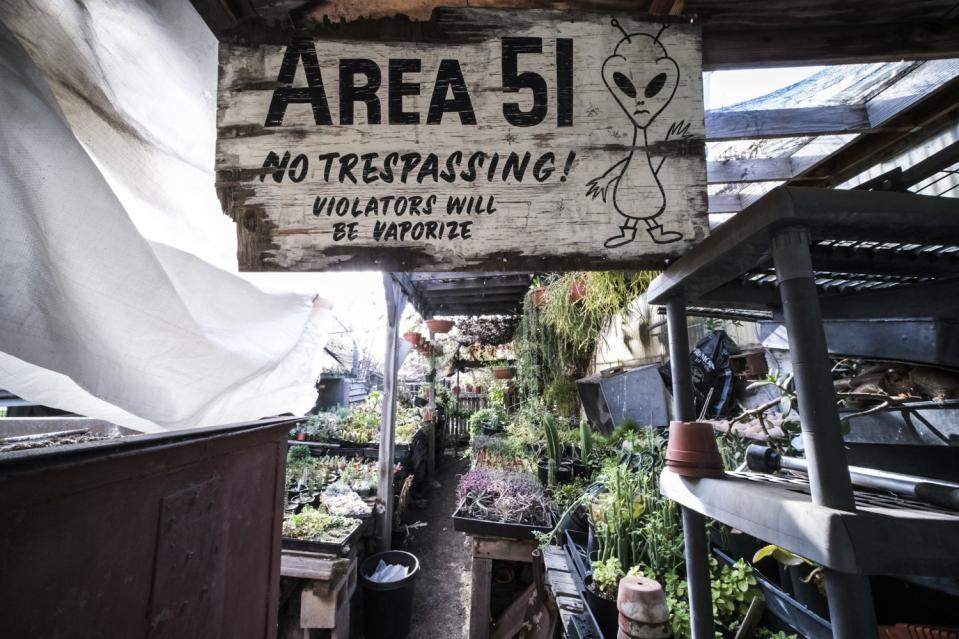
The change was good for the business, especially as Southern Californians looked increasingly for drought-resistant plants. "Every year since I started has been a good year, better than the last," he said, "except in 1994 after the Northridge earthquake. The epicenter was about a mile east of us, and there was a lot of damage. Nobody wanted to mess around with a garden until they had fixed up their house."
He's in his mid-60s now, with a girlfriend but no children or plans to marry. He's in good health, with no plans to quit the business he loves, but he has looked ahead. Bernstein has long been a fan and member of the Nature Conservancy — one of his favorite "vacations" was heading to a remote location in Texas to visit a conservancy preserve that protects Mexican free-tailed bats — so he's put his business into a trust to be taken over by the conservancy once he dies.
And he has no illusions that the business will continue without him. The land is worth more than all his flats of succulents combined, he said. The true value, he says, is the joy he gets from working every day.
"I contemplated selling for a while — a friend of my accountant was actually very interested — and he spent three or four weeks hanging out with me, trying to figure out what I did, but at the end he backed out. He said he couldn't figure out what I was doing and he couldn't take on a business where all the information was in my head."
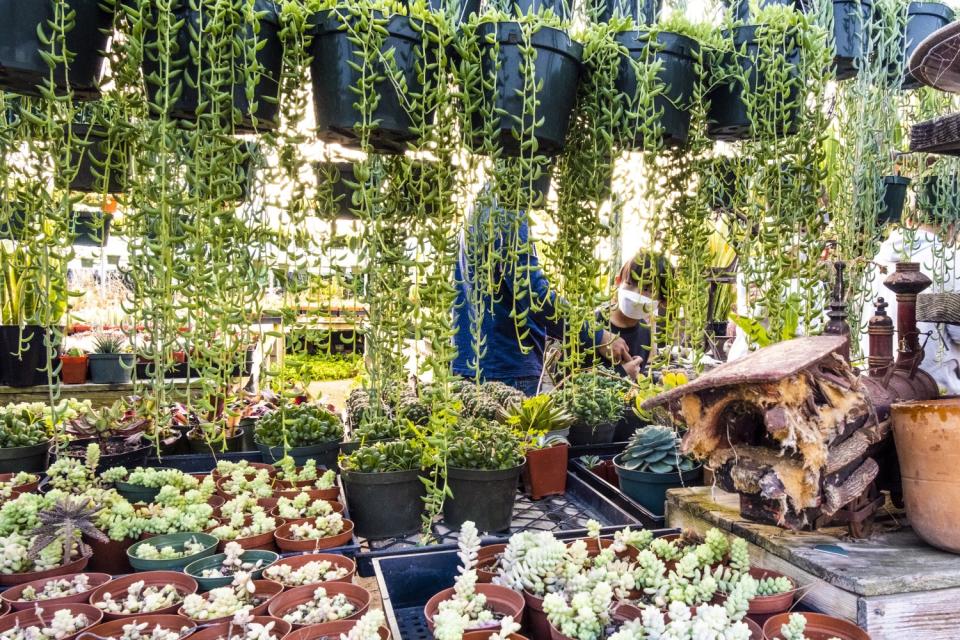
So selling is no longer an option, or a worry. Bernstein is relieved to have the trust established so all he needs to do now is focus on the work he loves, and his unofficial role as a healer.
He told a story about a woman who came into the nursery one recent Saturday and wandered for several hours. When she was finally ready to buy, Bernstein said she told him how much she'd enjoyed her visit.
"She said it was the best therapy she'd had in months," he said, "We talked for a while, and I asked her what she did for a living and" — he paused for effect — "she said, 'I'm a therapist.'"
He chortled quietly, another vindication of his deep-felt belief that all we need is a little nature and beauty to get us through this terrible pandemic and our addiction to screens.
So come to the Cactus Ranch for the color. Come for the wonder. Come for the therapy.
Just remember to come on a weekend and be sure to bring cash.
For the record:
1:29 p.m. May 14, 2021: An earlier version of this story referred to the Euphorbia ammak as a cactus. Although it looks like a cactus and is often mistaken for a cactus, it is a succulent.
This story originally appeared in Los Angeles Times.

